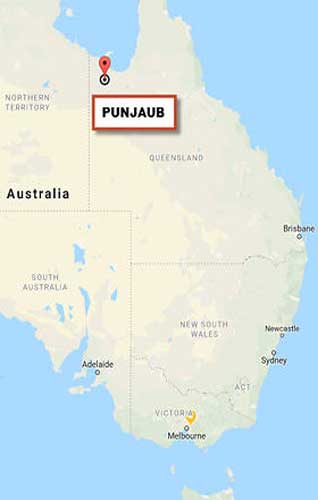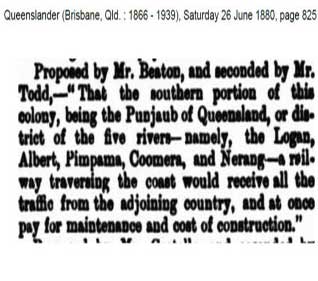Travel
A Land of Five Rivers Called Punjaub …
In Queensland, Australia
MANPREET KAUR SINGH
Situated at the border of Queensland and Northern Territory is the land called Punjaub, with an area covering 446 sq miles or 715 sq kilometres. It was given the name Punjaub in the 19th century, and is still goes by the same name.
Australian Sikh Heritage Association's Tarunpreet Singh has revealed how he discovered "a Punjab right here in Australia - which you can visit without boarding a ship or taking your passport along. This is probably the best new year gift for our community, to feel proud that Sikh history has documented evidence of its presence and influence in Australia since the 1880's.”
Several newspaper items preserved in Australia's national archives show that the area was formally named Punjaub in 1880, and it was specifically given this name because it had five rivers that flowed through it - Logan, Albert, Pimpania, Coomera and Nerang.
Domiciled in the district of Burke and containing a landmass of 446 sq miles, Punjaub cattle station was sold to Messrs Travers and Gibson for £2000, as reported in the Rockhampton Morning Bulletin of Saturday, 7 August 1880. It was sold by SG Watson, Esq of Melbourne.
"It had a homestead, which probably even had a commercial purpose where people could stay for holidays," says Mr Tarunpreet Singh.
There is at least one reference of a couple heading to Punjaub for their honeymoon.
Apart from being known as a major cattle station in the area, Punjaub boasts of a very fertile land, covered in orchards of fruit trees including "orange, lemon, mandarin, comquat, guava, mango, mulberry, banana and fig."
Tarunpreet Singh said, "It is quite clear that there was a Sikh presence in Queensland and adjoining areas in the mid- late 1800s. In fact we know that out of the 19 members in the Burke and Wills Expedition of 1860–61, there were 4 Afghans. It started from Melbourne to Gulf of Carpentaria. The expedition had a massive camel called Golah Singh – which creates interest that there could be a Sikh cameleer among these Afghans."
Could he possibly have inspired the name Punjaub?
"I'm currently trying to get in touch with Mr Kennedy, the current owner of the property, to see if he can shed light on how the name came about," said Tarunpreet Singh.
"Not only this, but many people in the indigenous community of Mt Isa, actually go by the surname Punjaub, much like villagers in the subcontinent’s Punjab tend to do - they usually take the name of their village as their surname."
For example, a report published in the North West Star shows a picture of some indigenous children of Mt Isa, with the surname Punjaub.
There are more articles, including one by the ABC, which features children from Mt Isa with the surname Punjaub.
What's more, the adjoining estate is named 'Almora', which further deepens the connection of the Australian Punjaub with Punjab - both are named so because they are the land of five rivers, and both have an adjoining land called "Almora".
Tarunpreet Singh is exploring further avenues to find out how the Australian Punjaub earned its name, and to unearth another chapter of Australian Sikh heritage.
'The more we know about our history in Australia, the more at home we'll feel - and of course, we will be able to celebrate our rich heritage in Australia."
[Courtesy: The Special Broadcasting Service (SBS), Australia. Edited for sikhchic.com]
January 3, 2018
Conversation about this article
1: Ari Singh (Sofia, Bulgaria), January 03, 2018, 1:16 PM.
There is also an area called Punjab in the centre of Afghanistan!




